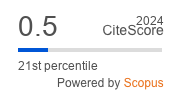The competence building in healthcare manager training
Abstract
This article discusses the importance of competence building in managerial health care staff, and the development of appropriate competence building models (competence profiles). The authors did expert interviews of 16 professors of the organizational departments at Razumovsky Saratov State Medical University. We determined importance of the competencies presented in the State educational standard for «Health care organization and public health» programs for the department heads; deputy heads (vice-head) and head physicians (chiefs) of medical organizations, as well as what future graduates need «to know», «be able to» and «to have», i.e. formulated appropriate competence building models. These models can be used both to develop training programs and healthcare personnel policy.
About the Authors
V. A. ReshetnikovRussian Federation
Vladimir A. Reshetnikov - Doctor of Medical Science, Professor, Head of N.A. Semashko Department of Public Health and Healthcare I.M. Sechenov First Moscow State Medical University.
8/2, Trubezkaya str., Moscow, Russia, 119991
Tel.: +7 (965) 268-03-50
N. G. Korshever
Russian Federation
Doctor of Medical Science, Professor, with the Department of Public Health and Health (with courses of Law and History of Medicine), Razumovsky Saratov State Medical University.
A. I. Dorovskaya
Russian Federation
Assistant with the Department of Public Health and Health (with courses of Law and History of Medicine), Razumovsky Saratov State Medical University.
References
1. Averin E.A. Formation of key competencies in health care organizations. Proceedings of the St. Petersburg Univ. of Economics and Finance. 2012; 6. Available at: http://www.cyberleninka.ru/article/n/formirovanie-klyuchevyh-kompetentsiy-v-organizatsiyah-zdravoohraneniya#ixzz3Yd1QepWz (accessed February 1, 2016) (in Russian).
2. Beshelev S.D., Gurvich F.G. Mathematical and statistical methods of expert estimates. Moscow: Statistics; 1976: 116 (in Russian).
3. Bogdan N.N. Managerial competence in the field of health care managers. Health and education in Siberia: the Electronic Sci. J. 2012; 5. Available at: http://www.ngmu.ru/cozo/mos/article/text_full.php?id=790 (accessed February 1, 2016) (in Russian).
4. Zimin E.I. Gorkova T.Y. System approach to professional management training for health. Social aspects of public health. 2010; 3: 1–12 (in Russian).
5. Protopopov A.A., Yerugin M.V., Korshever N.G. et al. Methodological aspects of the training of health managers. Saratov J. of Med. Sci. 2012; 8 (1): 1017–1022 (in Russian).
6. Reshetnikov V.A., Nesvizh Y.N. Kasimovskaya N.A. Contribution of N.A. Semashko to the development of medical prevention in Russia (to the 140th anniversary of his birth). Sechenovskiy Vestnik. 2014; 3 (17): 29–33 (in Russian).
7. Reshetnikov V.A., Skvirskaya G.P., Syrtsova L.E. et al. Conceptual approaches to training in the field of health administration of the Russian Federation. Health. 2013; 6: 9–14 (in Russian).
8. Jasko B.A. Psychology of management in the healthcare system: the competence approach – 2011. Available at: http://www.cyberleninka.ru/article/n/psihologiya-menedzhmenta-v-sisteme-zdravoohraneniya-kompetentnostnyy-podhod#ixzz3YdJaKeDS (accessed February 1, 2016) (in Russian).






































